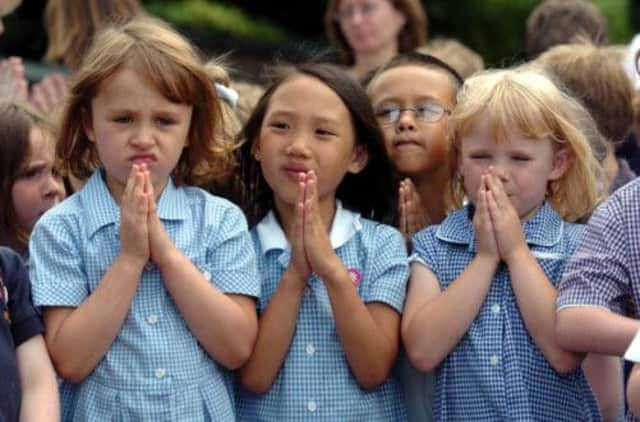Pupils to get religious guidance despite protests


The sessions, usually during school assemblies, still have a “clear value”, ministers said.
Parents can already opt out if they do not want their children to take part in the activity, also known as “time for reflection”.
Advertisement
Hide AdAdvertisement
Hide AdThe National Secular Society lodged a petition at Holyrood calling for a change that would have resulted in parents having to opt in, with the presumption being that they did not want their children to take part.
The Rev Sandy Fraser, convener of the Church of Scotland’s education committee, welcomed the government’s decision and said there were “misconceptions” about the modern form of religious observance.
“Chaplains are only ever there if the school invites them in,” he said. “They are not trying to convert children. They are essentially raising awareness of spirituality, of otherness, a sense of something other than materialism.
“Religious observance or time for reflection in 2013 is a wide-ranging and inclusive experience led by professionals who understand the diversity of 21st-century Scotland and see that diversity as strength.”
The Scottish Government said the current system was “relevant and up to date” and that ministers were “not persuaded, based on the evidence given, that a move to an opt-in system would be helpful to young learners”.
In a submission to Holyrood’s petitions committee, the government said: “[Religious observance] can offer opportunities for young people to reflect meaningfully on different points of view and values, including their own.
“It creates chances to think about the nature and possible meaning of life and humans’ place in the world. It can promote critical thinking, supporting the development of awareness that not all people think the same or share the same ideas and experiences about life.”
But the National Secular Society said the current opt-out presumed a “uniformity of belief and practice” among pupils and was no longer appropriate for modern Scotland.
Advertisement
Hide AdAdvertisement
Hide AdIt also said only one parent in five was “properly aware” of their right to opt out. “Situations frequently arise where by default a child takes part in religious activities of which the parents would strongly disapprove,” it said.
Instead, parents and older pupils should be able to opt in to religious observance, which would avoid “such distressing situations”. It said this would ensure the “integrity of participation in religious observance and should be welcomed by believers and non-believers alike”.
However, the Scottish Catholic Education Service also rejected an opt-in system. Director Michael McGrath insisted current safeguards were sufficient, adding that religious observance offered young people a chance to celebrate the “values, beliefs, traditions and achievements” of the school community.
He told MSPs: “It is designed uniquely to address the need for students to develop their spiritual capacities, providing time and space to reflect deeply on events, experiences, aspirations.
“Such reflection is supported by the wisdom from the treasury of our country’s culture and our religious traditions. But it can also be enriched by the varied experience of other cultures, faiths and traditions. This important experience is not provided for by any other area of the curriculum.”